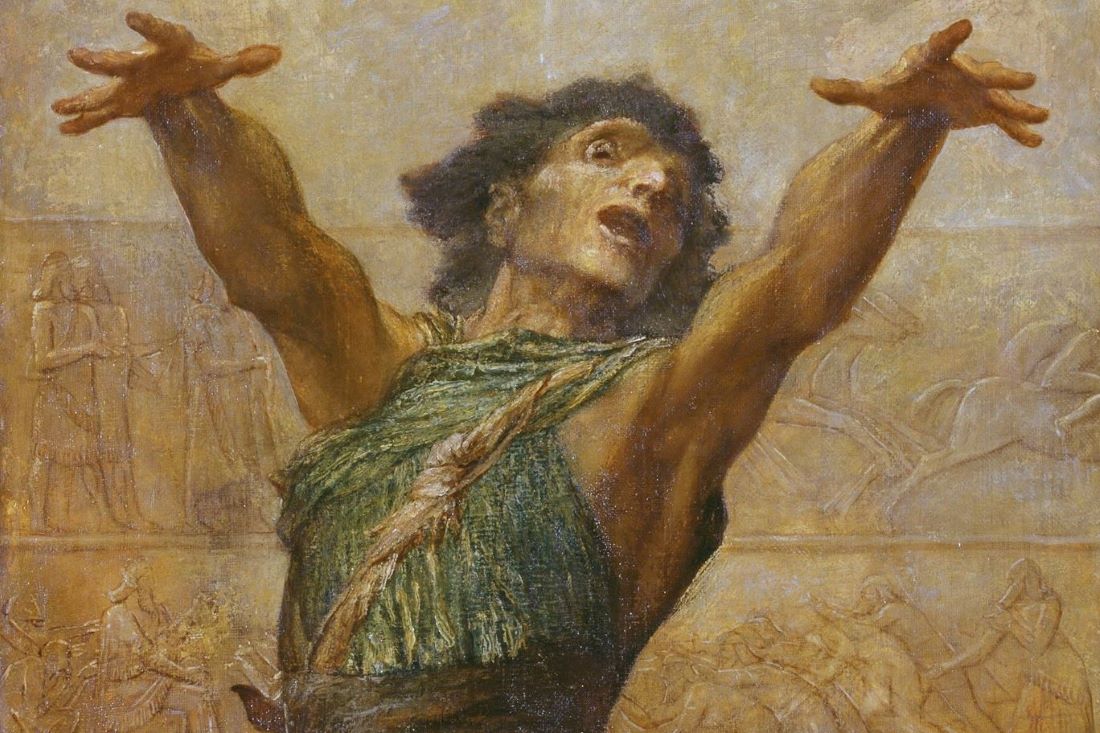What if we were waiting for Jonah? What if our city were the seat of an empire whose ways had run afoul of the Lord’s delight? What if everyone—from peasant to king—were implicated? What if the word of the Lord were on the way to proclaim to us that we were in the 11th hour, that the time of destruction was at hand, and that now was the time to repent? In other words, what if we were Nineveh?
When Jonah went to Nineveh, he but opened his mouth and Nineveh was converted. Never before and never since has a prophet been so successful, so immediately. No sooner did the sound of the prophet’s voice reach the people’s ears than the whole city repented—everyone put on sackcloth and the king sat in ashes. Nineveh was spared and made new.
Jonah was an unwilling messenger, to say the least. I do not imagine his prophetic utterances were especially impassioned as compared to other prophetic utterances in other times, for other nations, under other conditions. By comparison, his utterances probably lacked luster.
Of course, the word of the Lord is powerful in itself. Of course, the Lord does not depend on his messengers for his work, even though he works through his messengers to accomplish his will. Of course, the Lord’s word to Nineveh was urgent, and of course the Ninevites had everything to lose. But the same could be said of every other nation that turned a deaf ear to the word of the Lord before and after, including Israel and Judah.
What was different about Nineveh? I imagine that Nineveh must have been quite unpleasant before Jonah arrived. Yes, it was flushed with wealth in comparison to others, and yes, it was mighty in the ways of the world. But we know what abides just below the surface of such powerful cities and nations—how widespread, subterranean dissatisfaction festers underneath the opulence and comfort of the status quo. Nothing prepares you for a potential conversion quite like sustained, stolid discontentment.
The remarkable thing is not that Nineveh suddenly realized it was in trouble. The remarkable thing is that when the moment arrived for letting go of its deadening ways, the whole city repented. Off came the wealth, off came the comfort, and out went the status quo. Nineveh knelt.
Today in Your Hearing
March 4, 2020, was Wednesday of the First Week of Lent. The end of the first reading for daily Mass went like this: “When God saw by their actions how they turned from their evil way, he repented of the evil that he had threatened to do to them; he did not carry it out” (Jon 3:10).
If it was not on that day then it was not long afterwards that the daily Lenten readings stopped sounding hyperbolic and began sounding timely.
On March 10, Tuesday of the Second Week of Lent: “Wash yourselves clean! Put away your misdeeds from before my eyes; cease doing evil; learn to do good . . . Come now, let us set things right, says the Lord” (Isa 10:16–18).
March 17, Tuesday of the Third Week of Lent: “For we are reduced, O Lord, beyond any other nation, brought low everywhere in the world this day because of our sins . . . Do not let us be put to shame, but deal with us in your kindness and great mercy” (Dan 3:37, 41–42).
March 20, Friday of the Third Week of Lent: “We shall say no more, ‘Our god,’ to the works of our hands” (Hos 14:4).
March 23, Monday of the Fourth Week of Lent: “Thus says the Lord: Lo, I am about to create new heavens and a new earth; The things of the past shall not be remembered or come to mind” (Isa 65:17).
March 31, Tuesday of the Fifth Week of Lent: “O Lord, hear my prayer, and let my cry come to you. Hide not your face from me in the day of my distress. Incline your ear to me; in the day when I call, answer me speedily . . . Let this be written for the generation to come, and let his future creatures praise the Lord: ‘The Lord looked down from his holy height, from heaven he beheld the earth, To hear the groaning of the prisoners, to release those doomed to die” (Ps 102: 2–3, 19–21).
April 4, Friday of the Fifth Week of Lent: “The breakers of death surged round about me, the destroying floods overwhelmed me; The cords of the nether world enmeshed me, the snares of death overtook me . . . In my distress I called upon the LORD and cried out to my God; From his temple he heard my voice, and my cry to him reached his ears” (Psalm 18: 5–6, 7).
The Lenten lectionary reads like a dialogue between the Lord and a people in peril. It might as well be the call and response of the Lord and the Ninevites, with Jonah standing in between. Indeed, Jonah entered the lectionary this Lent in the first week, on March 4.
On that same day—March 4—there were 158 confirmed cases of the novel coronavirus in the United States. The UK “soared” from 51 to 85 confirmed cases. The Italian government decided to close its schools and universities. And Jesus said: “This generation is an evil generation; it seeks a sign, but no sign will be given it, except the sign of Jonah” (Luke 11:29).
What was the sign of Jonah? The arrival of Jonah meant the word of the Lord had come, the time for conversion was at hand. And Nineveh was ready.
Now Is the Very Acceptable Time
The novel coronavirus is not the Lord’s prophet. Death, sickness, isolation, desperation, and anxiety are not the works of the Lord. We are not in the 11th hour for being saved from a virus.
None of this is God’s work but it is the context of God’s call. You might call the overlap of the virus’s surge with Lent coincidental, or you might recognize it as providential. In either case, the Lord calls us to conversion. The lectionary would have proclaimed that call this year, virus or no virus.
If we—as a city, as a nation, as a people–do not heed this call to conversion under these conditions, then what will it take? If not now, when? Would it require the threat of our utter annihilation for us to fundamentally change our ways?
As by a trumpet blast, our customs were halted quite suddenly. Our American, Western, or maybe even global pace of life crashed into forced inactivity, virtually without warning. Events were canceled and calendars cleared. Did we really like all that movement and what it was doing to us? Were we not perpetually exhausted? Had we not felt like we were always running from one thing to another, and running behind at that? And then it all stopped. It was sudden, jarring, frustrating. But was it not also, in some way, a relief?
The market has been punishing us. Stocks plummeted. We try to correct for the momentous drop, and the market drops further, then it rises over the whispers of something else, then drops again. It is like we are trying to please some distant, mercurial deity. But this is a god we created, Mammon, who feeds on our worry and scourges us for it. It is a god who serves the wealthy and tempts the lowly with the prospect of wealth, then it lashes out at the whole of society at once. Do we like what our hands have made?
We cannot meet face to face; we cannot be in touch by actual touch. Screens mediate our encounters. But long before our schools and offices and public spaces closed, had we not habitually opted for tech over touch? Is this not what we asked for through our preferences and actions? Do we like it?
If you could for a moment believe that the earth itself had a mind, you might very well wonder if this pandemic was the earth’s way of striking back at us, telling us to get back into balance with the rest of creation and live up to our profound responsibility. Because of the virus, our planes are not flying over oceans, our cars are not running over land, our factories are not discharging their waste into the air. For several weeks already the earth has breathed without the plumes of our incessant activity. Much is silent. Did we notice how much we missed silence or the slowness of nature?
Such ecological issues are proving to be just as much inside us as outside us. Most of us do not remember a pace of life other than the one we lived in until we were forced to stop. We were long becoming more and more estranged from the people around us and our communities. We had ceased spending time at home in any meaningful sense. Our kids have been run from this to that, chasing some notion of thriving we conjured up for them. We had forgotten what it was like to be bored without distraction. We have grown accustomed to building the conditions of comfort that prosperous nations and classes enjoy upon the suffering and exploitation of the many. We have been so consumed with productivity and work and metrics that it was impossible to imagine anything else. Well, this is something else.
It is easier to name what we miss or what we are losing in a time such as this, so I recently asked people what they appreciate or like about the way things are at present. They said things like: Regular walks together as a family. Family dinner every night. Praying the Office morning and evening, or praying the rosary. Making a daily practice of speaking about what your grateful for in your home. More sleep. Listening to the stories of elders. It is odd that none of these things suddenly became possible when the virus shut down society. They were already possible.
For the poor, there is likely little if anything to appreciate in our current condition. They did not have safety nets to fall back on in times of crisis, because every time is, for them, a time of crisis. But now the jobs the “working poor” depend on are vanishing. The resources for survival are being snatched up by those with means. There are no lock-downs or quarantines for the homeless: they remain homeless, and they remain together in their homelessness. The vulnerable have become even more vulnerable. They are not victims of the current conditions so much as victims of the conditions we perpetuated in our cities and nations before disaster struck.
This virus, our suffering, and the widespread anxiety are not the works of the Lord, but this is the context of the Lord’s call. The Ninevites must have been quite dissatisfied with their lives well before Jonah arrived, though perhaps they never quite recognized it. But when the crisis came and they did recognize their discontent, they did a remarkable thing: they changed. It turns out that nothing prepares you for a potential conversion quite like sustained, stolid discontentment.
Lean Not on Your Own Understanding
Are we waiting for something else to force us out of our discontentment? Do we really want to just go back to exactly the way things were? Must we still wait for a sign to change our ways?
“This generation is an evil generation; it seeks a sign, but no sign will be given it, except the sign of Jonah.” Maybe Jesus is speaking to us. Maybe the sign of Jonah is the sudden recognition of the ephemerality and insecurity of the world we have made for ourselves. Maybe the urgency of the moment is in the unsustainability of our ecological practices, including the practices of our human ecology. Maybe the word of the Lord is revealing our long unheeded desire to change our ways.
The prophet Jonah was not sent to this or that individual. Jonah was sent to a city: the seat of an empire. The city did not start a new project, establish a new initiative, or adopt a new charter based on its own designs. Instead, everyone from peasant to king took on practices of repentance. Nineveh repented and when you repent, you cannot set the terms.
Any serious examination of conscience must reckon with the possibility that we are, in fact, Nineveh. How much are we willing to let go of? Many of us—even our political and civic leaders—are sending up pleas begging for aid and relief. The urgency of the moment is grabbing our collective attention. We are uncertain, unstable, and fearful, not merely as individuals but as a city, a nation, a people.
Do we long only for a return to our previous status quo? The king of Nineveh did not plead for the Lord to spare his kingdom from destruction so he could keep ruling it as he had been. He was willing to let all his own designs burn to the ground. Then he put on a sackcloth and sat in the ashes.
Are we willing to imagine or even long for a world other than the one we have created for ourselves? Would we be willing to suffer for it? Would we listen to the word of the Lord calling us to justice, calling us to make a preferential option for the orphan and the widow and the poor and the exploited, calling us to let go of our addiction to global commerce? Would we heed the call to live with less and to live more slowly?
Penance means being honest witnesses against ourselves. Jonah prophesied to the most unlikely of honest witnesses. The Ninevites accused themselves, not someone or something else. As for them, so for us: a prayer of penitence without restitution does not work. You cannot ask the Lord to remove the consequences of sin while continuing to benefit from goods accrued by sin. Renunciation is the key to bringing about reconciliation. We cannot pray to return to what we had if what we had was unjust.
If on March 4, or March 31, or today we pray for the Lord to spare us from our suffering, then our prayer commits us to refraining from setting the terms. This might all sound like high-minded, over-spiritualized reflections, but the Lenten readings did not seem so hyperbolic this year. They seemed rather timely. And honestly, if not this, then what would it take for us to change our ways?
If we are waiting for a sign, we wait in vain. The only sign is the sign of Jonah. And we are not waiting for Jonah; Jonah has come.


